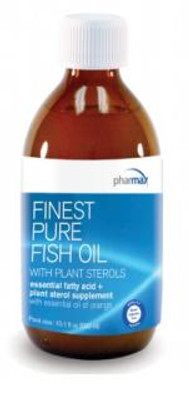Product Overview
Pharmax Finest Pure Fish Oil with Plant Sterols (Orange)- 10.1 fl oz (300 ml)
• 850 mg EPA and 625 mg DHA per serving size
• Helps support cognitive health and/or brain function (1)
• Helps maintain/support cardiovascular health (2)
• Helps to reduce serum triglycerides/triacylglycerols (3)
• Sourced from sardine and anchovy
• NEO-3™ natural EPA and DHA enrichment
• Includes plant sterols
• Plant sterol esters (provided as vegetable oil)
• Convenient, great-tasting liquid format
• Essential oils of orange flavor increases patient compliance
References:
1-2 NHPD Monograph on Fish Oil. March 2009.
3 NHPD Monograph on Plant Sterol Esters. October 2009.
Additional product info:
Fish oils may improve cardiovascular health by altering lipid metabolism, inducing haemodynamic changes, decreasing arrhythmias, modulating platelet function, improving endothelial function and inhibiting inflammatory pathways (3). In fact, fish oil is recognized by the NHPD of Health Canada to help support and maintain cardiovascular health and to help reduce serum triglycerides/triacylglycerols (4). Eicosapentaenoic acid (EPA; 22:5n-3) and docosahexaenoic acid (DHA; 22:6n-3) are the 2 principal omega-3 fatty acids in marine oils. Recent data from human studies showed that these 2 fatty acids have differential effects on serum lipids and lipoproteins, serum glucose (4 grams EPA), blood pressure (4 grams DHA), heart rate (4 grams DHA) and endothelial function (5). EPA and DHA alter membrane fluidity, interact with transcription factors such as PPAR and sterol regulatory element binding protein, and are substrates for enzymes including cyclooxygenase, lipoxygenase and cytochrome P450 (6). Studies also show that EPA and DHA (1.6-2.0 grams EPA and 0.9-1.2 grams DHA) found in fish oils generate bioactive lipid mediators that reduce inflammation and polymorphonuclear leukocyte recruitment in numerous inflammatory disease models (7),(8) . The independent effects of EPA and DHA are however poorly understood. While both EPA and DHA decrease TAG levels, only DHA appears to increase HDL and LDL particle size. Evidence to date also suggests that 2.8-4 grams DHA is more efficient in decreasing blood pressure, heart rate and platelet aggregation compared to EPA (9). 4 grams EPA, but not DHA, appears to increase fasting glucose concentrations (10). Thus, reduction of postprandial triacylglycerol (TG) concentration may be cardioprotective. Studies have shown that chronic omega-3 fatty acid supplementation (4 grams of either EPA or DHA) significantly lowers postprandial TG concentrations regardless of the type of fat in test meal (11).
EPA and DHA are also crucial to brain development and normal brain functioning. DHA is particularly important to brain functioning due to its influence on neural membrane properties, which modulate cell signalling. DHA concentration in the brain decreases with age in humans and this has been postulated to be consequential to the age-related deterioration in central nervous system functions (12). As such, fish oil supplementation helps support cognitive health and brain function (13).
Plant sterols are plant compounds with similar chemical structure and biological functions as cholesterol. It was recognised in the 1950s that plant sterols lower serum concentrations of cholesterol by reducing the absorption of cholesterol from the gut by competing for the limited space of cholesterol in mixed micelles (the packages in the intestinal lumen that deliver mixtures of lipids for absorption into the mucosal cells). Plant sterols reduce the absorption of both dietary and biliary cholesterol from the intestinal tract by 30-50% (14),(15),(16) . The FDA authorized the use of labelling health claims for foods containing plant sterol esters for reducing the risk of coronary heart disease based on the FDA's conclusion that plant sterol esters consumption at 1.3 grams daily may reduce the risk of coronary heart disease by lowering blood cholesterol levels (17).
References:
3 Cottin SC, Sanders TA, Hall WL. The differential effects of EPA and DHA on cardiovascular risk factors. Proc Nutr Soc. 2011 May;70(2):215-31. Abstract; Page 225, Conclusion
4 NHPD Monograph on Fish Oil. March 2009.
5 Woodman RJ, Mori TA, Burke V, Puddey IB, Watts GF, Beilin LJ. Effects of purified eicosapentaenoic and docosahexaenoic acids on glycemic control, blood pressure, and serum lipids in type 2 diabetic patients with treated hypertension. Am J Clin Nutr. 2002 Nov;76(5):1007-15. Page 1007, Introduction
6 Cottin SC, Sanders TA, Hall WL. The differential effects of EPA and DHA on cardiovascular risk factors. Proc Nutr Soc. 2011 May;70(2):215-31. Abstract; Page 225, Conclusion
7 McDaniel, J.C., Massey, K. and Nicolaou, A. Fish oil supplementation alters levels of lipid mediators of inflammation in microenvironment of acute human wounds. Wound Repair Regen. 2011 Mar-Apr;19(2):189-200. Page 189, Abstract & Introduction
8 van der Meij, B.S., Langius, J.A., Smit, E.F., Spreeuwenberg, M.D., von Blomberg, B.M., Heijboer, A.C., Paul, M.A. and van Leeuwen, P.A. Oral nutritional supplements containing (n-3) polyunsaturated fatty acids affect the nutritional status of patients with stage III non-small cell lung cancer during multimodality treatment . J Nutr. 2010 Oct;140(10):1774-80. Page 1775, 2nd paragraph
9 Cottin SC, Sanders TA, Hall WL. The differential effects of EPA and DHA on cardiovascular risk factors. Proc Nutr Soc. 2011 May;70(2):215-31. Abstract; Page 225, Conclusion
10 Woodman RJ, Mori TA, Burke V, Puddey IB, Watts GF, Beilin LJ. Effects of purified eicosapentaenoic and docosahexaenoic acids on glycemic control, blood pressure, and serum lipids in type 2 diabetic patients with treated hypertension. Am J Clin Nutr. 2002 Nov;76(5):1007-15. Page 1007, Introduction
11 Park, Y. and Harris, W.S. Omega-3 fatty acid supplementation accelerates chylomicron triglyceride clearance. J Lipid Res. 2003 Mar;44(3):455-63. Page 455, Introduction
12 Danthiir V, Burns NR, Nettelbeck T, Wilson C, Wittert G. The Older People, Omega-3, and Cognitive Health (EPOCH) trial design and methodology: A randomised, double-blind, controlled trial investigating the effect of long-chain omega-3 fatty acids on cognitive ageing and wellbeing in cognitively healthy older adults. Nutr J. 2011 Oct 20;10(1):117. Page 2, Background, 2nd paragraph
13 NHPD Monograph on Fish Oil. March 2009.
14 Micallef, M.A. and Garg, M.L. Anti-inflammatory and cardioprotective effects of n-3 polyunsaturated fatty acids and plant sterols in hyperlipidemic individuals. Atherosclerosis. 2009 Jun;204(2):476-82. Page 477, 2nd paragraph
15 NHPD Monograph on Plant Sterol Esters. October 2009.
16 Patch CS, Tapsell LC, Williams PG, Gordon M. Plant sterols as dietary adjuvants in the reduction of cardiovascular risk: theory and evidence. Vasc Health Risk Manag. 2006;2(2):157-62. Page 158, 2nd paragraph, right side;
17 Food and Drug Administration. 21 CFR 101.83. 2011. http://www.fda.gov/Food/GuidanceComplianceRegulatoryInformation/Guidance...
Other ingredients: essential oil of orange, natural mixed tocopherols









